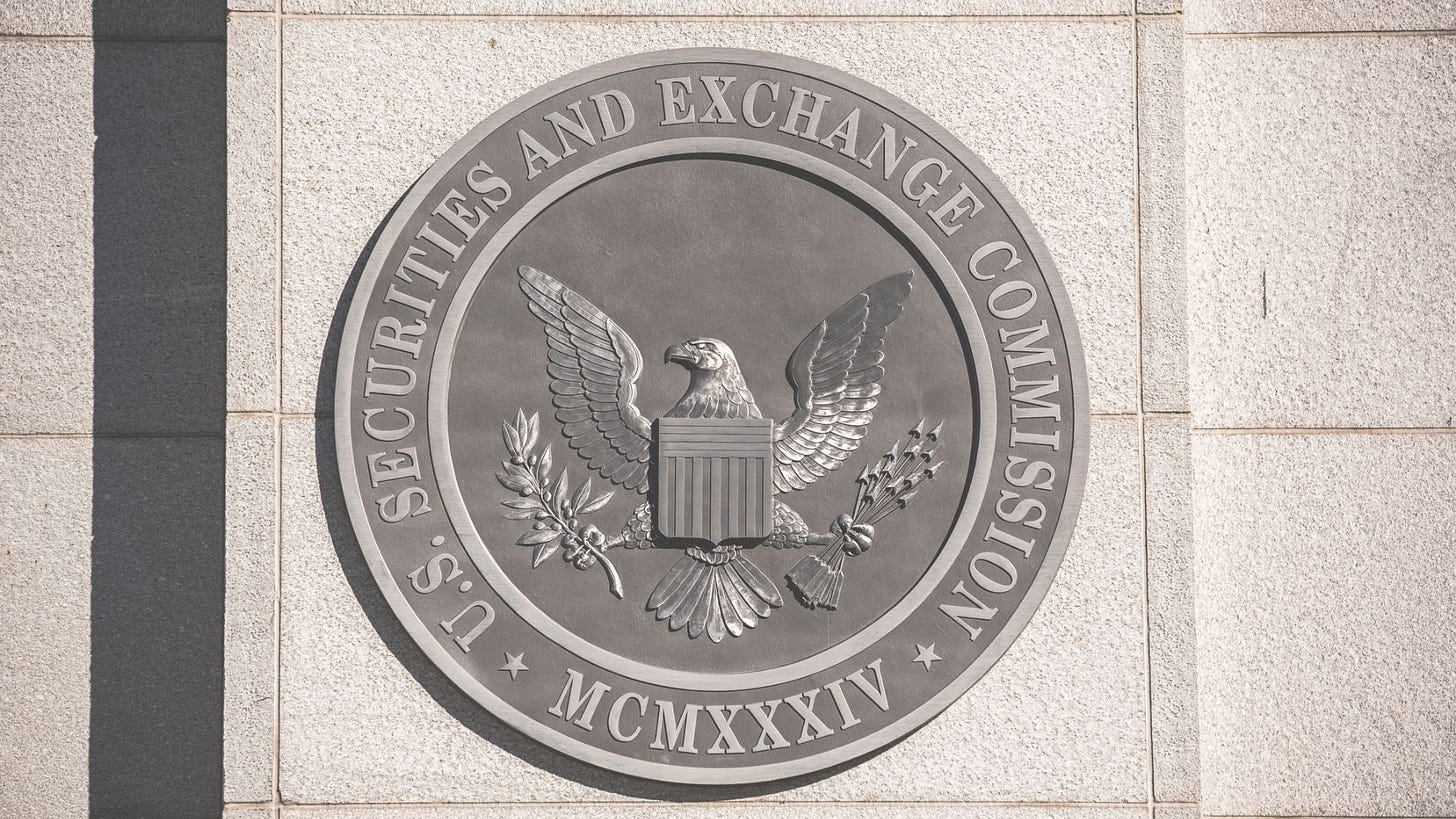The top five climate risk stories this week
1) SEC proposes climate risk disclosure rule

Publicly listed companies in the US would have to report their greenhouse gas emissions and detailed information on their climate risks under a proposed rule issued by the Securities and Exchange Commission (SEC) on Monday.
The 510-page proposal follows years of campaigning by civil society groups, investor coalitions, and Democratic policymakers motivated by concerns that the current disclosure regime does not compel firms to explain how climate change could affect their businesses.
“Over the generations, the SEC has stepped in when there’s significant need for the disclosure of information relevant to investors’ decisions,” said Gary Gensler, Chair of the SEC, in a statement supporting the proposal. “Companies and investors alike would benefit from the clear rules of the road proposed in this release.”
If enacted, the rule would force companies to describe their governance, strategy, and risk management in relation to climate risks in ways similar to those recommended by the Task Force on Climate-related Financial Disclosures (TCFD), the world’s leading voluntary climate reporting framework. Firms would have to say how climate change could impact their businesses, strategies, and forward-looking projections, disclose how their boards and managers oversee climate risks, and detail how climate risks are identified, assessed, and managed. This information would have to feature in companies’ registration statements, annual reports, and other filings.
The rule would also require disclosure of climate-related financial statement metrics and accompanying disclosures in a note to their audited financial statements. For example, a company would have to report the financial impacts of extreme weather events and other physical risks, as well as “transition activities” on their revenue, cost of revenue, sale of property, plant, and equipment, and more.
All companies would have to report their direct Scope 1 greenhouse gas emissions and indirect Scope 2 emissions, too. This data would have to be disclosed both in absolute and intensity terms. Large companies would also have to obtain attestation reports from third-party service providers to provide assurance that their Scope 1 and 2 numbers are sound.
Scope 3 emissions — the indirect emissions from upstream or downstream a company’s value chain — would also have to be disclosed by companies where they are deemed to be material, or by companies that have set emissions reduction goals that include Scope 3. However, these emissions figures would be excluded from the attestation requirement, and subject to a “safe harbor” from liability. Publicly traded financial institutions would likely meet the Scope 3 emission reporting threshold, as the rule counts emissions generated by their investment and lending portfolios — which make up the bulk of their overall carbon footprint.
A company that adopts a climate transition plan would be required under the rule to describe it in their filings, along with any relevant metrics, targets, and data. The plan would also have to be updated each year with lists of actions taken by the company to achieve its targets or goals.
The proposed rule would cover domestic and foreign companies listed on US exchanges, of which there were approximately 7,000 in 2020. If the finalized rule were adopted by December 2022, the SEC projects that the largest firms would have to start filing climate-related disclosures from 2024, and smaller reporting companies from 2026.
The comment period on the proposal lasts until at least May 20, 2022. The SEC is then likely to get to work on a final rule that could be enacted before the end of this year. However, the proposal has elicited strong opposition from Republican legislators and certain industry groups, which makes it probable a final rule would be challenged in the courts, delaying or even derailing the disclosure requirements entirely.
(Learn more about the SEC proposed rule by reading Manifest Climate’s latest blog: ‘What’s in the SEC’s New Climate Disclosure Rule Proposal’)
2) European central bankers mull climate capital add-ons

Banks with flawed climate transition plans could face additional capital charges, the Governor of the Banque de France has said.
In a speech on Tuesday, François Villeroy de Galhau described various ways financial authorities could police climate-related risks to the financial system. He said banks should be required to publish transition plans that are then scrutinized by supervisors. If these plans are “misaligned” with climate policy targets, this “could be seen as an indication of material transition risk — leading potentially to a capital add-on,” he said.
However, Galhau said that as a first step climate stress tests should be made compulsory for banks and insurers. Once their climate risks are “properly evaluated”, then additional capital requirements could be justified. He added that he would prefer any add-ons to be applied under the Pillar 2 framework, which sets out how supervisors can amend capital requirements following firm-specific reviews.
Galhau’s comments came on the same day Bloomberg reported that members of the European Central Bank’s (ECB) supervisory board plan to get to work incorporating climate risks into the Europe-wide rulebook on setting bank capital requirements. Discussions are slated to begin in the second half of 2022 following the results of the ECB’s supervisory climate stress test.
3) Report flags disconnect between financial institutions’ climate actions and targets

The world’s largest banks, asset managers, and insurers are not taking actions or setting goals that match their carbon reduction plans, a new report by InfluenceMapshows.
The UK-based think tank found that of the top 30 publicly listed financial institutions globally, 29 have set 2050 net-zero targets for their lending and investment portfolios. But together these institutions pumped $740 billion into the fossil fuel industry in 2020 and 2021 “in direct contrast to science-based guidelines … which make clear the need for rapid scale-down of coal, oil and gas exploration and production and the halving of global emissions by 2030.”
InfluenceMap also found that all 30 companies are signed up to industry associations that are lobbying against effective climate policies. For example, the Alternative Investment Management Association wrote to the US Securities and Exchange Commission to oppose mandated climate risk disclosure for fund managers. Fifteen of the 30 institutions are also members of real-economy industry groups that lobby on behalf of the fossil fuel industry — including the US Chamber of Commerce and American Gas Association.
Sir Chris Hohn, founder of the hedge fund TCI and a well-known campaigner for meaningful climate action by financial institutions, said in a quote provided by InfluenceMap that any bank that makes a net-zero pledge while “actively lobbying against necessary climate regulation … is greenwashing.”
The report further found that only 11 of the 30 firms have set short-term emissions reduction targets for multiple sectors, raising questions as to how the other 19 plan to reach their net-zero goals.
4) Sustainability standards boards partner on corporate disclosure

Two leading standard-setters for climate disclosure have agreed to synchronize their activities to ensure basic sustainability information produced for investors continues to serve the needs of other stakeholders.
The International Sustainability Standards Board (ISSB) and Global Sustainability Standards Board (GSSB) said Thursday they had aligned their work programs and standard-setting activities through a memorandum of understanding. The ISSB is working on a global baseline standard of climate disclosures to help investors understand companies’ sustainability-related risks and opportunities. The GSSB oversees standards that organizations can use to report their impacts on the economy, environment and people to multiple stakeholders.
By joining forces, the two bodies could ensure new sustainability reporting standards relay information on how climate risks can impact companies as well as how companies impact the climate.
The ISSB-GSSB tie-up is the latest step in a long-running trend which has seen a hodgepodge of voluntary sustainability reporting initiatives gradually absorbed by established standard-setting organizations. The ISSB, set up by the IFRS Foundation — which oversees a major financial accounting standard-setter — took over the Value Reporting Foundation and Climate Disclosure Standards Board last year.
Emmanuel Faber, Chair of the ISSB, said: “For those interested in considering impact when assessing enterprise value, using the standards set by the ISSB and GSSB together will offer a complete and compatible suite of sustainability disclosures.”
The ISSB is expected to produce a draft of its climate-related disclosure standards later this year.
5) ING halts new oil and gas investments

Dutch lender ING said on Wednesday it will stop financing new oil and gas projects in a tightening of its climate transition plan.
The bank, the Netherlands’ largest with around €951 billion in assets, said the change aligned its climate plan with the ‘Net-Zero Emissions by 2050 Roadmap’ published by the International Energy Agency (IEA) last May. The roadmap insists that no new investments in coal, oil, and gas can take place if the world is to have a chance to limit global warming to 1.5°C. ING loaned around €3.6 billion to the upstream oil and gas industry in 2020, according to its climate report.
ING also said it would grow new financing of renewable energy 50% by the end of 2025 over 2021 levels. Today, financing of renewables makes up around 60% of the bank’s overall power generation portfolio. ING’s outstanding loans to the sector stood at €7.3 billion in 2020.
The bank will continue to support existing oil and gas projects, but taper its financing over time in line with the IEA’s roadmap and its own internal ‘Terra approach’ to decarbonizing its loan portfolio.
Maaike Beenes, a campaign lead at BankTrack, a climate advocacy group based in the Netherlands, said: “ING’s new commitment to end dedicated finance for new oil and gas fields is an important step in the right direction that all banks should follow. At the same time it allows ING to continue financing companies with plans to expand production of existing fields and even explore for new oil and gas fields. As a next step, ING should therefore go beyond the commitment it has made today, and also exclude fossil fuel expansion companies.”

